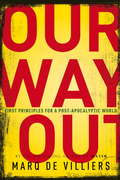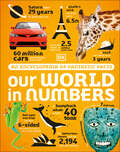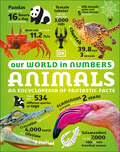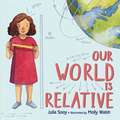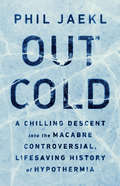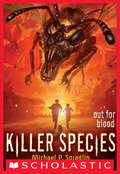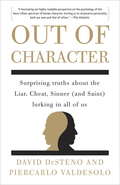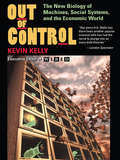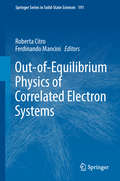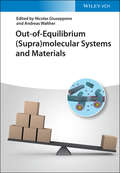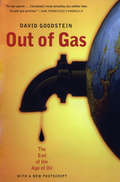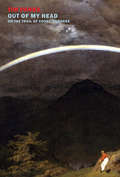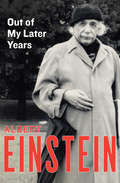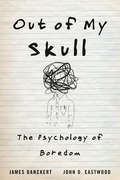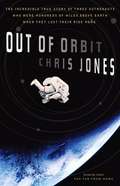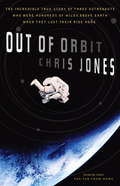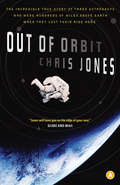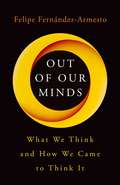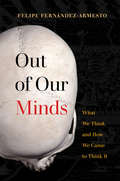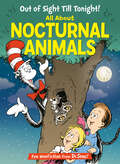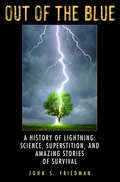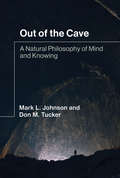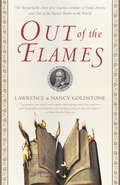- Table View
- List View
Our Way Out: Principles for a Post-apocalyptic World
by Marq De VilliersGlobal warming, energy shortages, overpopulation -- it's no wonder that as a society, we're in an apocalyptic mood. Out of an endless stream of gloomy prognoses for humanity's future, we have emerged with little inspiration and few concrete ideas for change. Our Way Out is the first time that our most urgent global challenges have been treated as aspects of a single, larger crisis -- and the first to acknowledge that while crises reinforce each other, solutions enable each other. The transformation to sustainability is already happening, in many small ways, in many parts of the world. Our Way Out shows us how we can scale up these efforts to create meaningful and lasting change.This is not a book on climate change, energy, or any other single issue -- it is the story of how within the solutions to the global crises we face, lie the seeds of something greater. It is a handbook for immense and exciting worldwide change. And, not least of all, it offers us robust hope that we can make things better.From the Hardcover edition.
Our World (Amadera Prthibi) class 7 - West Bengal Board: আমাদের পৃথিবী সপ্তম শ্রেণি
by West Bengal Board of Secondary Education"আমাদের পৃথিবী" একটি সপ্তম শ্রেণির ভূগোল এবং পরিবেশ শিক্ষার পাঠ্যপুস্তক যা পশ্চিমবঙ্গ মধ্যশিক্ষা পর্ষদ দ্বারা প্রকাশিত। এই বইটি সহজ এবং প্রাঞ্জল ভাষায় পরিবেশ এবং মানবজীবনের মধ্যে সম্পর্কের নানা দিক তুলে ধরেছে। বইটি জাতীয় পাঠক্রমের রূপরেখা ২০০৫ এবং শিক্ষার অধিকার আইন ২০০৯-এর নির্দেশিকা মেনে তৈরি করা হয়েছে। বিভিন্ন চিত্র, সারণি, এবং মানচিত্রের মাধ্যমে শিক্ষার্থীদের জন্য ভূগোলের মৌলিক ধারণাগুলোকে সহজবোধ্য এবং আকর্ষণীয় করে তোলার চেষ্টা করা হয়েছে। এতে পৃথিবীর গতি, ঋতু পরিবর্তন, বায়ুচাপ, ভূমিরূপ, নদী, শিলা, এবং দূষণের প্রভাব সহ এশিয়া, আফ্রিকা ও ইউরোপ মহাদেশের ভূগোল অন্তর্ভুক্ত করা হয়েছে। বইটির লক্ষ্য শিক্ষার্থীদের হাতে-কলমে শিক্ষা কার্যক্রমের মাধ্যমে জ্ঞান লাভে সহায়তা করা।
Our World in Numbers (DK Oour World in Numbers)
by DKZillions of fun figures at your fingertips!Are you eager to know all the most incredible facts and stats? Would you like to number-crunch your way around the wonders of our world?Arm yourself with nuggets of number knowledge and fantastic figures with this data-filled book that explores everything in our world from space to sports and animals to art. How long does it take to put on a spacesuit? How many times does a sloth poop in a week? How many stone blocks are there in the Great Pyramid at Giza? What percentage of your brain do you really use? With intriguing fact-bites and colorful data graphics, Our World in Numbers takes you on a remarkable adventure by numbers, telling you everything you could possibly need to know--and more!
Our World in Numbers Animals: An Encyclopedia of Fantastic Facts (DK Oour World in Numbers)
by DKLearn about everything in the animal kingdom with this book of extraordinary figures and number-based facts for children aged 9-12!Put the fun back into learning and take children on a number-crunching journey around the animal kingdom. From colossal mammals to tiny insects and everything in between, learn all about your favorite animals with more than 1,000 weird and wonderful numbers.Our World in Numbers: Animals will have you impressing your family and friends like never before with mind-blowing facts and stats on a vast range of different animal species. Children aged 9-12 will number-crunch their way around the animal kingdom, discovering everything from the age of the world&’s oldest animal and which bird has the most feathers, to which snake has the longest fangs and how long a tiger sleeps in a day.This animal book of fantastic figures offers:- More than 1,000 astonishing animal facts for children aged 9-12.- Different topics divided by 5 chapters, invertebrates, fish, amphibians and reptile, birds and mammals.- Eye-catching double page features, including vibrant photographs and graphics for every topic.- Fun and surprising information on more than 80 topics to engage children in the world around them.This data-packed adventure through the animal world is filled with everything you&’ve ever wanted to know about your favourite animals, with full-page photographs and fun, colorful images, wacky animal fact-bites and funky figures to become an animal expert!
Our World Is Relative
by Julia SooyA fun and engaging picture book from author Julia Sooy and illustrator Molly Walsh explaining Einstein's theory of relativity.Size, speed, weight, direction, distanceWe think of space and time as fixed and measurable.But these measurements—our experience of space and time—they are relative.Our world is relative.With simple, engaging text and vibrant art imbued with light and movement, Our World Is Relative offers a child's-eye view of time, space, and the vast role that relativity plays in comprehending our world. It's an introduction to Albert Einstein's theory of relativity, perfect for any curious young scientist.Longlisted for the American Association for the Advancement of Science/ Subaru Children's Science Picture Book Award
Out Cold: A Chilling Descent into the Macabre, Controversial, Lifesaving History of Hypothermia
by Phil Jaekl&“A fascinating look into the strange and sometimes unbelievable history of hypothermic medicine. Jaekl weaves together a story that is part history lesson and part science thriller. This is truly a must-read for any fan of science and science fiction!&” —Douglas Talk, MD/MPH, chief medical consultant, SpaceWorks Inc., Human Torpor Project The meaning of the word &“hypothermia&” has Greek origins and roughly translates to &“less heat.&” Its symptoms can be deadly—shivering, followed by confusion, irrationality, and even the illusion of feeling hot. But hypothermia has another side—it can be therapeutic. In Out Cold, science writer Phil Jaekl chronicles the underappreciated story of human innovation with cold, from Ancient Egypt, where it was used to treat skin irritations, to eighteenth-century London, where scientists used it in their first explorations of suspended animation. Throughout history, physicians have used cold to innovate life extension, enable distant space missions, and explore consciousness. Hypothermia may still conjure macabre images, like the bodies littering Mt. Everest and disembodied heads in cryo-freezers, but the reality is that modern science has invented numerous new life-saving cooling techniques based on what we&’ve learned over the centuries. And Out Cold reveals a surprisingly warm future for this chilling state.
Out for Blood: Out for Blood (Killer Species #3)
by Michael P. SpradlinThe action-packed series by Michael P. Spradlin returns. Each book covers a genetically engineered superpredator wreacking havoc on the environment.Dr. Catalyst has finally come unhinged. Twice the crazed scientist has released his super predators into the wild to combat invasive species, and twice Emmet Doyle and his best friend Calvin Geaux have exploded his efforts. Now he's out for something more than just snakes and fish. Dr. Catalyst wants revenge.It's a quiet night when Emmet takes his dog, Apollo, out for a walk in the backyard. Until the noise begins. Part batlike screech, part insect buzz -- it seems to be coming from the roof. Suddenly the sky is full of dark, beating shapes, and they're all headed straight for Emmet. Dr. Catalyst's newest creations are hungry, and only one thing will satisfy them. Blood.
Out of Character
by Piercarlo Valdesolo David DestenoHave you ever wondered why a trumpeter of family values would suddenly turn around and cheat on his wife? Why jealousy would send an otherwise level-headed person into a violent rage? What could drive a person to blow a family fortune at the blackjack tables? Or have you ever pondered what might make Mr. Right leave his beloved at the altar, why hypocrisy seems to be rampant, or even why, every once in awhile, even you are secretly tempted, to lie, cheat, or steal (or, conversely, help someone you never even met)? This book answers these questions and more, and in doing so, turns the prevailing wisdom about who we are upside down. Our character, argue psychologists DeSteno and Valdesolo, isn't a stable set of traits, but rather a shifting state that is subject to the constant push and pull of hidden mechanisms in our mind. And it's the battle between these dueling psychological forces that determine how we act at any given point in time. Drawing on the surprising results of the clever experiments concocted in their own laboratory, DeSteno and Valdesolo shed new scientific light on so many of the puzzling behaviors that regularly grace the headlines. For example, you'll learn: * Why Tiger Woods just couldn't resist the allure of his mistresses even though he had a picture-perfect family at home. And why no one, including those who knew him best, ever saw it coming. * Why even the shrewdest of investors can be tempted to gamble their fortunes away (and why risky financial behavior is driven by the same mechanisms that compel us to root for the underdog in sports). * Why Eliot Spitzer, who made a career of crusading against prostitution, turned out to be one of the most famous johns of all time. * Why Mel Gibson, a noted philanthropist and devout Catholic, has been repeatedly caught spewing racist rants, even though close friends say he doesn't have a racist bone in his body. * And why any of us is capable of doing the same, whether we believe it or not!A surprising look at the hidden forces driving the saint and sinner lurking in us all, Out of Character reveals why human behavior is so much more unpredictable than we ever realized. From the Hardcover edition.
Out of Control: The New Biology of Machines, Social Systems and the Economic World
by Kevin KellyGood analysis of emerging understanding of biological and non-biological systems composed of thousands or millions of agents.
Out-of-Equilibrium Physics of Correlated Electron Systems (Springer Series in Solid-State Sciences #191)
by Roberta Citro Ferdinando ManciniThis book is a wide-ranging survey of the physics of out-of-equilibrium systems of correlated electrons, ranging from the theoretical, to the numerical, computational and experimental aspects. It starts from basic approaches to non-equilibrium physics, such as the mean-field approach, then proceeds to more advanced methods, such as dynamical mean-field theory and master equation approaches. Lastly, it offers a comprehensive overview of the latest advances in experimental investigations of complex quantum materials by means of ultrafast spectroscopy.
Out-of-Equilibrium (Supra)molecular Systems and Materials
by Nicolas GiusepponeA must-have resource that covers everything from out-of-equilibrium chemical systems and materials to dissipative self-assemblies Out-of-Equilibrium Supramolecular Systems and Materials presents a comprehensive overview of the synthetic approaches that use supramolecular bonds in various out-of-thermodynamic equilibrium situations. With contributions from noted experts on the topic, the text contains information on the design of dissipative self-assemblies that maintain their structures when fueled by an external source of energy. The contributors also examine molecules and nanoscale objects and materials that can produce mechanical work based on molecular machines. Additionally, the book explores non-equilibrium supramolecular polymers that can be trapped in kinetically stable states, as well as out-of-equilibrium chemical systems and oscillators that are important to understand the emergence of complex behaviors and, in particular, the origin of life. This important book: Offers comprehensive coverage of fields from design of dissipative self-assemblies to non-equilibrium supramolecular polymers Presents information on a highly emerging and interdisciplinary topic Includes contributions from internationally renowned scientists Written for chemists, physical chemists, biochemists, material scientists, Out-of-Equilibrium Supramolecular Systems and Materials is an indispensable resource written by top scientists in the field.
Out of Gas: The End of the Age of Oil
by David GoodsteinScience tells us that an oil crisis is inevitable. Why and when? And what will our future look like without our favorite fuel? Our rate of oil discovery has reached its peak and will never be exceeded; rather, it is certain to decline--perhaps rapidly--forever forward. Meanwhile, over the past century, we have developed lifestyles firmly rooted in the promise of an endless, cheap supply. In this book, David Goodstein, professor of physics at Caltech, explains the underlying scientific principles of the inevitable fossil fuel shortage we face. He outlines the drastic effects a fossil fuel shortage will bring down on us. And he shows that there is an important silver lining to the need to switch to other sources of energy, for when we have burned up all the available oil, the earth's climate will have moved toward a truly life-threatening state. With its easy-to-grasp explanations of the science behind every aspect of our most urgent environmental policy decisions, Out of Gas is a handbook for the future of civilization.
Out of My Head: On the Trail of Consciousness
by Tim ParksAdventures in cutting-edge ideas about consciousness, from bestselling non-fiction writer Tim Parks.Hardly a day goes by without some discussion about whether computers can be conscious, whether our universe is some kind of simulation, whether mind is a unique quality of human beings or spread out across the universe like butter on bread. Most philosophers believe that our experience is locked inside our skulls, an unreliable representation of a quite different reality outside. Colour, smell and sound, they tell us, occur only in our heads. Yet when neuroscientists look inside our brains to see what's going on, they find only billions of neurons exchanging electrical impulses and releasing chemical substances.Five years ago, in a chance conversation, Tim Parks came across a radical new theory of consciousness that undercut this interpretation. This set him off on a quest to discover more about this fascinating topic and also led him to observe his own experience with immense attention.Out of My Head tells the gripping, highly personal, often surprisingly funny, story of Tim Parks' quest to discover more about this fascinating topic. It frames complex metaphysical considerations and technical laboratory experiments in terms we can all understand. Above all, it invites us to see space, time, colour and smell, sounds and sensations in an entirely new way. The world will feel more real after reading it.
Out of My Later Years: The Scientist, Philosopher, and Man Portrayed Through His Own Words
by Albert EinsteinAn inspiring collection of essays, in which Albert Einstein addresses the topics that fascinated him as a scientist, philosopher, and humanitarian Divided by subject matter—&“Science,&” &“Convictions and Beliefs,&” &“Public Affairs,&” etc.—these essays consider everything from the need for a &“supranational&” governing body to control war in the atomic age to freedom in research and education to Jewish history and Zionism to explanations of the physics and scientific thought that brought Albert Einstein world recognition. Throughout, Einstein&’s clear, eloquent voice presents an idealist&’s vision and relays complex theories to the layperson. Einstein&’s essays share his philosophical beliefs, scientific reasoning, and hopes for a brighter future, and show how one of the greatest minds of all time fully engaged with the changing world around him. This authorized ebook features rare photos and never-before-seen documents from the Albert Einstein Archives at the Hebrew University of Jerusalem.
Out of My Later Years: The Scientist, Philosopher, and Man Portrayed Through His Own Words
by Albert EinsteinAn inspiring collection of essays, in which Albert Einstein addresses the topics that fascinated him as a scientist, philosopher, and humanitarian Divided by subject matter—&“Science,&” &“Convictions and Beliefs,&” &“Public Affairs,&” etc.—these essays consider everything from the need for a &“supranational&” governing body to control war in the atomic age to freedom in research and education to Jewish history and Zionism to explanations of the physics and scientific thought that brought Albert Einstein world recognition. Throughout, Einstein&’s clear, eloquent voice presents an idealist&’s vision and relays complex theories to the layperson. Einstein&’s essays share his philosophical beliefs, scientific reasoning, and hopes for a brighter future, and show how one of the greatest minds of all time fully engaged with the changing world around him. This authorized ebook features rare photos and never-before-seen documents from the Albert Einstein Archives at the Hebrew University of Jerusalem.
Out of My Skull: The Psychology of Boredom
by James Danckert John D. EastwoodNo one likes to be bored. Two leading psychologists explain what causes boredom and how to listen to what it is telling you, so you can live a more engaged life. We avoid boredom at all costs. It makes us feel restless and agitated. Desperate for something to do, we play games on our phones, retie our shoes, or even count ceiling tiles. And if we escape it this time, eventually it will strike again. But what if we listened to boredom instead of banishing it? Psychologists James Danckert and John Eastwood contend that boredom isn’t bad for us. It’s just that we do a bad job of heeding its guidance. When we’re bored, our minds are telling us that whatever we are doing isn’t working—we’re failing to satisfy our basic psychological need to be engaged and effective. Too many of us respond poorly. We become prone to accidents, risky activities, loneliness, and ennui, and we waste ever more time on technological distractions. But, Danckert and Eastwood argue, we can let boredom have the opposite effect, motivating the change we need. The latest research suggests that an adaptive approach to boredom will help us avoid its troubling effects and, through its reminder to become aware and involved, might lead us to live fuller lives. Out of My Skull combines scientific findings with everyday observations to explain an experience we’d like to ignore, but from which we have a lot to learn. Boredom evolved to help us. It’s time we gave it a chance.
Out of Orbit: The True Story of How Three Astronauts Found Themselves Hundreds of Miles Above the Earth with No Way Home
by Chris JonesAn adventure set on the most dangerous frontier of all--outer space. In the nearly forty years since Neil Armstrong walked on the moon, space travel has come to be seen as a routine enterprise--at least until the shuttle "Columbia" disintegrated.
Out of Orbit
by Chris JonesOn February 1, 2003, the nation was stunned to watch the shuttle Columbia disintegrate into a blue-green sky. Despite the numerous new reports surrounding the tragedy, the public remained largely unaware that three men, U.S. astronauts Donald Pettit and Kenneth Bowersox, and Russian flight engineer Nikolai Budarin, remained orbiting the earth. With the launch program suspended indefinitely, these astronauts, who were already near the end of a fourteen-week mission, had suddenly lost their ride home.Out of Orbit is the harrowing, behind-the-scenes chronicle of the efforts of beleaguered Mission Controls in Houston and Moscow who worked frantically against the clock to bring their men safely back to Earth, ultimately settling on a plan that felt, at best, like a long shot. Given that no shuttle could come for them, the astronauts' only hope for a return flight became a Russian-built Soyuz TMA-1 capsule, latched to the side of the space station--a piece of equipment roughly the equivalent of a "padded box attached to a parachute," with a troubled history (in 1971 a malfunction in the Soyuz 11 capsule left three Russian astronauts dead) and dated technology. Gripping and faced-paced, Out of Orbit is an adventure in outer space that will keep you on the edge of your seat. In a day and age when space travel is poised to become available to masses, Out of Orbit vividly captures both its hazardous realities and soaring majesty.
Out of Orbit: The True Story of How Three Astronauts Found Themselves Hundreds of Miles Above the Earth With No Way Home
by Chris JonesIn February 2003, American astronauts Donald Pettit and Kenneth Bowersox and Russian flight engineer Nikolai Budarin were on a routine fourteen-week mission maintaining the International Space Station. But then the space shuttle Columbia exploded far beneath them. With the launch program suspended indefinitely, these astronauts had suddenly lost their ride back to earth. Out of Orbit chronicles the efforts of the beleaguered mission controls in Houston and Moscow as they worked frantically against the clock, ultimately settling on a plan that felt, at best, like a long shot. Latched to the side of the space station was a Russian-built Soyuz TMA-1 capsule, the rocket equivalent of a 1976 Gremlin. Despite the inherent danger, the Soyuz became the only hope to return Bowersox, Budarin, and Pettit home. Their harrowing journey back to earth is a powerful reminder that space travel remains an incredibly dangerous pursuit.
Out of Our Minds: What We Think and How We Came to Think It
by Felipe Fernández-Armesto&‘Immensely learned and ambitious…seam-bursting eclecticism and polymathic brio… This is by any standards a significant book and its author deserves high praise.&’ Literary ReviewTo imagine – to see that which is not there – is the startling ability that has fuelled human development and innovation through the centuries. As a species we stand alone in our remarkable capacity to refashion the world after the pictures in our minds. Traversing the realms of science, politics, religion, culture, philosophy and history, Felipe Fernández-Armesto reveals the thrilling and disquieting tales of our imaginative leaps. Through groundbreaking insights in cognitive science, he explores how and why we have ideas in the first place, providing a tantalising glimpse into who we are and what we might yet accomplish. Fernández-Armesto shows that bad ideas are often more influential than good ones; that the oldest recoverable thoughts include some of the best; that ideas of Western origin often issued from exchanges with the wider world; and that the pace of innovative thinking is under threat.
Out of Our Minds: What We Think and How We Came to Think It
by Felipe Fernández-ArmestoTo imagine—to see what is not there—is the startling ability that has fueled human development and innovation through the centuries. As a species we stand alone in our remarkable capacity to refashion the world after the picture in our minds. Traversing the realms of science, politics, religion, culture, philosophy, and history, Felipe Fernández-Armesto reveals the thrilling and disquieting tales of our imaginative leaps—from the first Homo sapiens to the present day. Through groundbreaking insights in cognitive science, Fernández-Armesto explores how and why we have ideas in the first place, providing a tantalizing glimpse into who we are and what we might yet accomplish. Unearthing and historical evidence, he begins by reconstructing the thoughts of our Paleolithic ancestors to reveal the subtlety and profundity of the thinking of early humans. A masterful paean to the human imagination from a wonderfully elegant thinker, Out of Our Minds shows that bad ideas are often more influential than good ones; that the oldest recoverable thoughts include some of the best; that ideas of Western origin often issued from exchanges with the wider world; and that the pace of innovative thinking is under threat.
Out of Sight Till Tonight! All About Nocturnal Animals: All About Nocturnal Animals (The Cat in the Hat's Learning Library)
by Tish RabeLaugh and learn with fun facts about raccoons, wolves, fireflies, and more—all told in Dr. Seuss&’s beloved rhyming style and starring the Cat in the Hat! &“I&’m the Cat in the Hat and tonight we&’ll take flight and meet some of the critters that come out at night.&” The Cat in the Hat&’s Learning Library series combines beloved characters, engaging rhymes, and Seussian illustrations to introduce children to non-fiction topics from the real world! Stay up past your bedtime and discover the world of nocturnal animals, including: • how bats use echolocation• why some desert animals hunt at night• how toads need to stay damp to survive• and much more! Perfect for story time and for the youngest readers, Out of Sight Till Tonight! All About Nocturnal Animals also includes an index, glossary, and suggestions for further learning. Look for more books in the Cat in the Hat&’s Learning Library series!If I Ran the Horse Show: All About HorsesClam-I-Am! All About the BeachMiles and Miles of Reptiles: All About ReptilesA Whale of a Tale! All About Porpoises, Dolphins, and WhalesSafari, So Good! All About African WildlifeThere's a Map on My Lap! All About MapsOh, the Lavas That Flow! All About VolcanoesWhat Cat Is That? All About CatsOnce upon a Mastodon: All About Prehistoric MammalsOh Say Can You Say What's the Weather Today? All About WeatherThe Cat on the Mat: All About Mindfulness
Out of the Blue
by John S. FriedmanThe odds of being hit by lightning each year are only about 1 in 750,000 in the U. S. And yet this rare phenomenon has inspired both fear and fascination for thousands of years. In this groundbreaking, brilliantly researched book, journalist John S. Friedman probes lightning’s scientific, spiritual, and cultural roots. Blending vibrant history with riveting first-hand accounts of those who have clashed with lightning and lived to tell about it,Out of the Bluecharts an extraordinary journey across the ages that explores our awe and dread in the face of one of nature’s most fearsome spectacles. Herman Melville called it “God’s burning finger. ” The ancient Romans feared it as the wrath of God. Today we have a more scientific understanding, so why our eternal fascination with lightning?Out of the Blueattempts to understand this towering force of nature, exploring the changing perceptions of lightning from the earliest civilizations through Ben Franklin’s revolutionary experiments to the hair-raising adventures of storm chasers like David Hoadley, who’s been chronicling extreme weather for half a century. And Friedman describes one of the most treacherous rescues ever attempted in American mountain climbing. Friedman profiles a Virginia ranger who was struck by lightning seven times—and dubbed the human lightning rod—along with scores of others who tell astonishing tales of rescue and survival. And he charts lightning’s profound, life-altering effects on the emotional and spiritual lives of its victims. Combining captivating fact with thrilling personal stories,Out of the Bluetells a remarkable true tale of fate and coincidence, discovery and divine retribution, science and superstition. As entertaining as it is informative, it is a book for outdoor adventurers, sports enthusiasts, science and weather buffs, nature lovers, and anyone who has ever been awed or frightened by the sight of lightning. From the Hardcover edition.
Out of the Cave: A Natural Philosophy of Mind and Knowing
by Mark L. Johnson Don M. TuckerFrom a philosopher and a neuropsychologist, a radical rethinking of certain traditional views about human cognition and behavior.Plato's Allegory of the Cave trapped us in the illusion that mind is separate from body and from the natural and physical world. Knowledge had to be eternal and absolute. Recent scientific advances, however, show that our bodies shape mind, thought, and language in a deep and pervasive way. In Out of the Cave, Mark Johnson and Don Tucker--a philosopher and a neuropsychologist--propose a radical rethinking of certain traditional views about human cognition and behavior. They argue for a theory of knowing as embodied, embedded, enactive, and emotionally based. Knowing is an ongoing process--shaped by our deepest biological and cultural values. Johnson and Tucker describe a natural philosophy of mind that is emerging through the convergence of biology, psychology, computer science, and philosophy, and they explain recent research showing that all of our higher-level cognitive activities are rooted in our bodies through processes of perception, motive control of action, and feeling. This developing natural philosophy of mind offers a psychological, philosophical, and neuroscientific account that is at once scientifically valid and subjectively meaningful--allowing us to know both ourselves and the world.
Out of the Flames: The Strange Journey of Michael Servetus and One of the Rarest Books in the World
by Lawrence Goldstone Nancy GoldstoneMichael Servetus is one of those hidden figureheads of history who is remembered not for his name, but for the revolutionary deeds that stand in his place. Both a scientist and a freethinking theologian, Servetus is credited with the discovery of pulmonary circulation in the human body as well as the authorship of a polemical masterpiece that cost him his life. The Chrisitianismi Restituto, a heretical work of biblical scholarship, written in 1553, aimed to refute the orthodox Christianity that Servetus' old colleague, John Calvin, supported. After the book spread through the ranks of Protestant hierarchy, Servetus was tried and agonizingly burned at the stake, the last known copy of the Restitutio chained to his leg. Servetus's execution is significant because it marked a turning point in the quest for freedom of expression, due largely to the development of the printing press and the proliferation of books in Renaissance Europe. Three copies of the Restitutio managed to survive the burning, despite every effort on the part of his enemies to destroy them. As a result, the book became almost a surrogate for its author, going into hiding and relying on covert distribution until it could be read freely, centuries later. Out of the Flames tracks the history of this special work, examining Servetus's life and times and the politics of the first information during the sixteenth century. Lawrence and Nancy Goldstone follow the clandestine journey of the three copies through the subsequent centuries and explore its author's legacy and influence over the thinkers that shared his spirit and genius, such as Leibniz, Voltaire, Rousseau, Jefferson, Clarence Dorrow, and William Osler. Out of the Flames is an extraordinary story providing testament to the power of ideas, the enduring legacy of books, and the triumph of individual courage.
